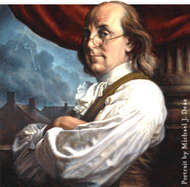The tickets are paid for. The visa application is in the mail. It seems likely that my son John and I will be heading to Chengdu, Sichuan, China on May 22, taking his exchange teacher home. (Not this way, of course.)
A decade ago, I would have gone with great optimism, a representative of American values. Now? Well, consider these two stories, and where in the world they occurred:
- Hundreds of people quietly protest a new refinery, expecting to be heard.
- Regime opponents are subject to political prosecutions, to having their homes torched, while elections are stolen and public opinion is ignored.
The first story is from Chengdu. The second is from Alabama. As others have noted, the Bush war against democracy continues apace, and even seems to be accelerating.
I think it’s time for us to get off our ideological high horses and start talking first principles, not just the what but the why.
Democracy and freedom aren’t just better.
They work. The more highly-developed a society becomes, the better they work.
Democracy provides complex societies with flexibility. It enables governments to change their minds. It provides competition among political ideas, and choices of political elites. Without democracy any government becomes sclerotic, ingrown, inefficient, and less economically competitive.
Freedom is not just essential to democracy, but has economic value in and of itself. Without freedom even capitalism is limited in what it can do. Freedom of thought creates competition among values, it creates art, and it enables great technological leaps which are at the heart of success in the market.
Decision makers around the world tend to give lip service to freedom and democracy, but in fact most detest both. Democracy holds them accountable. It can bring them down, even cost them their own freedom. Individual liberty is also a messy business, with unpredictable results. Nothing a bureaucrat hates more than unpredictability.
So freedom and democracy are always under threat, yet freedom and democracy are the only ways we have found through which societies can endure rapid change, especially change caused by technology. The faster technology advances, in other words, the more important freedom and democracy become.
Throughout the 20th century great movements sought to keep these forces contained. The great battles of the 20th century were not fought on battlefields so much as behind them, in factories and salons. The link between economic growth, societal adaption to rapid change, and the forces of freedom and democracy were tested.
Freedom and democracy won.
Given this reality the way toward world domination is clear. Elites must embrace forces they most naturally fear, namely freedom and democracy. Wherever these forces are allowed to grow, they inevitably consume increasing amounts of popular imagination, which is the great raw material of our time.
The fear that freedom and democracy will lead to disorder and chaos is, frankly, bunk. People instinctively know the difference between liberty and mere license. It is in the continuing conflict between such values that democracy does its best work, once it is allowed to work.
The results are quite messy. Those seeking perfectibility in man are looking in the wrong place. We are all, unfortunately, yahoos. Only God, and God’s nature, are perfect, and in that perfection you will find man limited to a minor role.
Freedom and democracy, capitalism and the inalienable rights of man, these are not perfection. But as technology advances they provide the closest thing we have to the incredible flexibility found in nature, where every event — even extinction — is another species’ word for opportunity.
This century does not belong to China, or America, or inevitably to India or Russia. It belongs to those societies, and those people, who grasp hold most firmly of the flexibility provided by freedom and democracy, in all its forms, in all its imperfection.
Right now all sides are starting off equal in that regard. And that last sentence is the saddest I have ever written.













